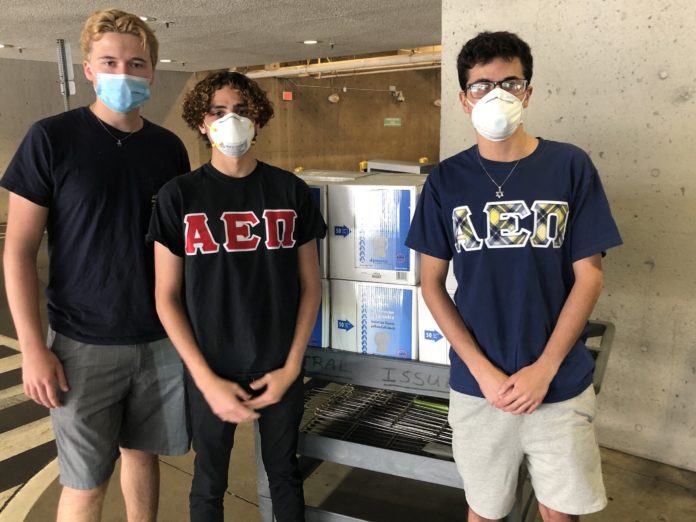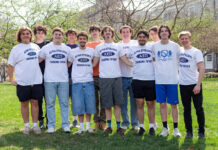With more than 1 million confirmed cases of COVID-19 in the United States to date, many of the hardest-hit states include those with large Jewish populations — New York, New Jersey, Massachusetts, Pennsylvania, Illinois, California. As a result, Jewish nonprofit organizations in the heath care arena, including nursing homes and assisted-living centers, hospice facilities and those who provide home care for Holocaust survivors and other vulnerable populations, have witnessed overwhelming fatality rates as a result of the pandemic.
Unwilling to sit idly by, a group of “next generation” young communal Jewish leaders and heads of nonprofit Jewish organizations have mobilized, along with the mainstream Jewish community, to launch a world-wide emergency campaign — called “Pledge to Protect” — to purchase and deliver life-saving personal protective equipment to the above-mentioned front-line protectors.
Alex Jakubowski, executive director at KAHAL, an organization that connects Jewish students studying abroad with experiences in their host communities, told JNS that in February “KAHAL saw the writing on the wall.”
“Since we have students in China and around the world, we decided to change our whole organization and become a COVID-19 support organization,” he said.
Jakubowski said he realized that he was hearing pleas for help over and over again from the same segments of the health care community. “There is a global shortage of PPE equipment in nursing homes and hospice care. These frontline workers, especially those outside of a hospital setting, are not given equipment by state governments. They are not the first priority. We also learned that this equipment needs to be imported at outrageous prices.”
Utilizing KAHAL’s global network and partnering with other Jewish organizations, a well-oiled procurement, shipment and distribution chain for PPE equipment was set up quickly to assist caregivers at more than 200 Jewish institutions throughout the country that support not only Jewish workers, but people of all faiths.
Thanks to the initiative, as of April 28, nearly 2 million pieces of PPE have been delivered to local agencies and communities — surgical mask, gloves, gowns and other equipment — with the goal of reducing the risk of transmission of the novel coronavirus. All of this comes even before the “hard launch” of the campaign, as much more is needed.
‘Without that gear, it could have cost lives’
Jay Feldman, managing director at the Alpha Epsilon Pi Fraternity Foundation, told JNS that Jakubowski reached out and got his organization on board to work together on the critical project. “We have a wide network, including 90,000 alumni. I was able to put KAHAL in touch with some of our people to start setting up a data network, and to manage and plot the distribution operation.”
At the same time, he added, “we realized, we needed someone for that last mile — the actual delivery. So we tapped into our student network and alumni, and they stepped up as volunteers to actually pick up and deliver the equipment to the institutions.”
AEPi CEO James Fleischer noted that “the mission of Alpha Epsilon Pi International Fraternity — to develop the future leaders of the world’s Jewish communities — is in clear evidence in this program. We are proud that our undergraduate and alumni brothers are playing a vital role in this amazing project. … The fact that so many of these undergraduates recognize the needs of their global community and the importance of tikkun olam at a time like this, means that we are doing our job for the future of Jewish communities.”
Jakubowski said the PPE has been ordered from places all over the world, including China, Hong Kong, Mexico and other countries. One of the obstacles, he says, is fierce competition, as well as delays in shipping and receiving the equipment.
“When shipments are delayed, we must create opportunities to get these agencies what they need,” he said.
Jakubowski is quick to praise AEPi for stepping up to the plate. In one instance, he says that thousands of disposable gowns worn to treat those in isolation needed to be dropped off. He adds that “alum Jordan Elcott created the initiative with AEPi chapters, and got the gowns and more items delivered. Without that gear, it could have cost lives.”
Jordan’s father, Shalom Elcott, works as the philanthropic curator at Samueli Foundation, a family foundation focused on health, education, the Jewish community and Israel. He has been part of the managing team on the campaign, working with Jakubowski, Feldman and representatives from other organizations.
As someone who has had many more years of experience in the nonprofit sector, he has much praise for such quick mobilization during an intense time of crisis.
He says Jakubowski was able to get mainstream and well-established large umbrella Jewish organizations on board, such as the Jewish Federations of North America and the Jewish Funders Network, to be active partners in the campaign. “In just five weeks, he brought longtime established organizations together in a powerful partnership with Jewish leaders from around the world.”
Jakubowski says that $408,000 has been raised so far for the campaign during this “soft launch” stage, with the official crowdfunding aspect of the campaign having commenced on April 29, Israel’s Independence Day. The campaign goal is currently $3 million.
Elcott says that of the total amount raised so far, it is remarkable that more than $100,000 was donated by people living in Israel. “The Jewish Funders Network in Israel has been extremely generous even as demands in Israel [as a result of the virus] are herculean.”
Perhaps most importantly are the results of the campaign on the ground, as reported by the agencies themselves that are being assisted during these difficult and frightening times.
According to a representative of the Kline Galland Home for the aged in Seattle, “we just tested all our residents this weekend and came back with ZERO positive cases. We all know this is 100 percent because we have the PPE to treat our patients safely and responsibly. You all are saving lives.”























